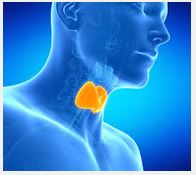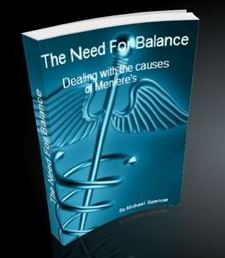Meniere’s Disease and Thyroid Dysfunction
Posted Under: Meniere's Disease Triggers & Causes,Meniere's Disease and Nutrition
How Thyroid Dysfunction may affect Meniere’s disease and what to do about it
Table of Contents
Thyroid dysfunction, Hyperthyroidism, Hypothyroidism and Thyroid autoimmunity have all been linked to Meniere’s Disease.

If you understand the importance of the immune system it makes complete sense for this to be the case in many people. It makes perfect sense when you consider the success so many people have had in ridding themselves of their symptoms over the past decade or so using quality dietary supplementation and/or change of diet.
When you starve disease states of toxins and antigens (the bad stuff) and feed the immune system all the nutrients it needs, and the body needs in general (the good stuff) then balance returns to hormonal systems and the immune response is strong enough to deal with inflammation, toxins and antigens.
Yet despite the numerous clinical studies and papers written giving evidence to this fact the link to Meniere’s disease remains relatively ignored.
Do you have Meniere’s disease and thyroid dysfunction?
Have you been tested?
It seems some within the medical community are unable to join the dots or seem unwilling to look at any possibility beyond their specific field of medicine. “Take the drugs, and learn to live with it, there is nothing more to be done” seems the mantra of far too many treating ENT doctors or general physicians. If you are a Meniere’s sufferer I am sure there is a very good chance you either have been or will be faced with this demoralizing attitude at some point.
Learn to live with it? I have never known anyone who could possibly just learn to live with Meniere’s disease. I have known thousands who decided to learn without it, took action themselves and now live symptom free.
In our modern society, culture and in this case to be more specific the medical community, ‘compartmentalization’ often means one department has no clue what another department is doing. We have our specific role in our jobs and do not know what is happening in the office behind us, let alone in the organization we belong to as whole. This creates an inability to see the bigger picture, join the dots and an inability to come to any other conclusion except what we are ‘told’ to think by perceived authority.
Stick a white coat on somebody to make them look like a scientist or doctor and the general public will literally do anything they are told. This blind faith in perceived authority has actually been tested by psychologists with some shocking results on how far people will go against their own better judgement.
In all professions, some are great at what they do, while others are not. The medical profession is no different. We are all human after all.
During my research for the book The Need for Balance I had a conversation with a doctor in Japan who worked in immunology. I asked her what she believed to be the most important aspect of the immune system. After pausing and looking a little uncomfortable she answered, “probably hemoglobin or bone marrow”. No surprise there, both are of course vital to the immune system.
When I asked her how important the Thyroid gland was and how was it connected to the immune system, she looked a bit surprised and told me the Thyroid is not connected to the immune system, it regulates hormones.
I suggested that surely the thyroid is connected, as everything is connected inside the body and a problem in one area can have a knock on effect and cause dysfunction elsewhere. People with thyroid dysfunctions have weakened immune systems.
So if the immune system were weak then the Thyroid could be affected and result in hormonal imbalances and that would in turn result in illness. The Thyroid regulates the Thymus and the thymus is responsible for T-Cells (white blood cells vital for immune protection) so the Thyroid must be important.
Alternatively if the body’s metabolism was out of sync then vital nutrients might not be getting to where they should, including the Thyroid. Either way, it has direct links to the immune system whether it be in a causal or effected manner. (read about the relevance of T-cells to Meniere;s here)
She tacitly agreed and said she would have to study the Thyroid more.
Her specific area of expertise was hematology and was unable to join immune system and thyroid function. Unable to join the dots as a result of focusing all her time on blood work within her compartmentalized field of expertise.
According to PubMed.Com the US official government medical website, in a paper from 2006 titled, ‘The immune system as a regulator of thyroid hormone activity.’ It states, “thyroid-stimulating hormone (TSH) can be produced by many types of extra-pituitary cells–including T cells, B cells, splenic dendritic cells, bone marrow hematopoietic cells, intestinal epithelial cells, and lymphocytes”
It also states that “functional significance of those TSH pathways historically has been largely ignored“
It goes on to state, “There is now, however, evidence linking cells of the immune system to the regulation of thyroid hormone activity ” and “the immune system may act to modulate neuroendocrine function during times of host stress”
It may be that the Thyroid is an under appreciated part of the puzzle in many illnesses and the number of people not diagnosed correctly as a result might be very large indeed. The Thyroid is part of the endocrine system and among many other things secretes hormones that regulate metabolism. Sometimes referred to as the “master gland or the ” heart” of the endocrine system.
As one of the largest endocrine glands, it manages important body processes, including protein creation, energy levels, regulation of body temperature, heart rate and blood pressure and secretes hormones that regulate metabolism.
The thyroid gland is located in the lower neck and secretes hormones into the blood, which are then carried into the body’s tissues. The thyroid gland mainly produces a hormone called thyroxine (T4), which is then converted by each of the body’s organs to the active form triiodothyronine (T3). These hormones are vital for regulating all of the above mentioned functions in the body.
Blood flow, metabolism and endocrine have been linked in studies to Meniere’s. Whatever is going on in the endolymphatic sac in the ear that is causing Meniere’s symptoms may be, at least in some cases, the end result in a line of different dysfunctions through the endocrine system and thyroid.
To emphasize how the knock on effect can be relevant, consider that Pituitary dysfunction can mean the pituitary gland cannot send a message to the thyroid gland to produce more thyroid hormone when needed. Everything is connected and the need for balance in all areas is important.
A 2008 clinical study published on NIH ‘Possible association between thyroid autoimmunity and Menière’s disease’
It stated, “Overall, our data demonstrate a significant association between MD and thyroid autoimmunity, which suggests that an autoimmune factor is involved in the aetiopathogenesis of this disease. 38% of the MD patients had significant autoantibody levels.
Furthermore, 14% of the MD patients were hyperthyroid. In conclusion, our data show a significant association between thyroid autoimmunity and MD, confirming the possible immune pathogenesis of the latter disorder”
‘Prevalence of Thyroid Dysfunction in Patients With Meniere’s Disease’
The Journal of American Medical Association (JAMA) reported in 2004 on this clinical study that concluded,
“Ménière’s disease is associated with corrected hypothyroidism.“
Along the same lines, a 2014 study published on Medscape.com concluded that their findings suggests that circulating antithyroid autoantibodies may represent a risk factor for developing vestibular dysfunction.
It would seem clear that for at least some people there is a connection with Thyroid dysfunctions and Meniere’s Disease symptoms.
How to keep your Thyroid healthy through dietary considerations
Considering the possibility that your Meniere’s disease symptoms may be a result of endocrine and thyroid dysfunctions, it makes sense to keep your thyroid and immune system healthy and balanced.
Environmental and dietary toxins can be a major reason for Thyroid dysfunction. Toxins are present in our environment, and there’s not much we can do to eliminate all of them in the short term. They are here and we have to deal with it. We can, limit our exposure to toxic compounds, reducing the likelihood of experiencing issues with our thyroid.
The worst toxins for thyroid health
- Fluoride Almost 70 percent of the U.S. water supply is fluoridated to help prevent cavities. However, what very few people know according to Journal of Clinical Endocrinology is that fluoride was actually prescribed as a remedy for an overactive thyroid during the first half of the 20th century. According to some reports, 2 to 5 mg of fluoride per day over a period of months was all it took to lower thyroid function; that’s about the same amount people drinking fluoridated water are exposed to daily. This would explain a LOT wouldn’t it? A 2015 study published in the Journal of Epidemiology and Community Health in the UK concluded that locations with fluoridated water were 30 percent more likely to have high levels of hypothyroidism.
- PFCs The Journal of Clinical Endocrinology and Metabolism reports that a higher level of perfluorinated chemicals (PFCs) in the blood could affect thyroid function in women. PFCs are used in the manufacturing of lots of common things, from your mattress to fast food containers! Even though the use of the chemicals is being phased out in the U.S., imported products could still be a concern.
- Pesticide Thanks to ‘big Agra’ (no names mentioned) India has seen a rise in thyroid disorders , but there are measures in place to make sure much of the population has sufficient access to iodine, something essential for thyroid function. One recent study reported in the Times of India suggested this spike is due to pesticide and other chemical exposure, with experts noting almost 60 percent of cases aren’t connected to iodine-deficiency. While the idea of pesticide exposure and thyroid problems is nothing new, maintaining iodine levels and avoiding pesticides could be the perfect combination according to The American Journal of Epidemiology.
- Perchlorate According to studies published in Pharmacology Review.. Any number of nasty toxins could be the cause of an unhealthy thyroid, perchlorate is a strong candidate. But while there are numerous studies linking it with thyroid problems, the FDA still approved it for use as an anti-static agent in food packaging, making avoiding it a lot more difficult.
- Bromine Studies in the Journal of Clinical Pathology confirm that Bromine is an endocrine disruptor and toxic to the thyroid, but you will find it in everything from pool cleaner to pasta, . Often, even healthy patients can have high levels of the flame-retardant substance in their bodies. Polybrominated diphenyl ethers (PBDEs) are even finding their way into the breast milk of American women according to a study published in Environmental Health Perspectives. One common source of bromine is brominated vegetable oil—which is still found in many drinks—so it would be wise to check labels.
- BPA BPA is an endocrine disruptor and can affect hormone levels and thyroid balance. There are many studies documenting BPA’s effects on the thyroid in adults and children. One study published in Environmental Health Perspectives looked at newborn babies and their mothers. The study suggested higher levels of BPA cause a decrease in thyroid function in women. All of the baby boys, though, had an increase in thyroid function causing problems from the higher levels of BPA.
While your family history can also play a role in endocrine problems, avoiding toxic exposure would appear to be a very wise move.
Looking after your thyroid and preventing thyroid conditions
Treat the Underlying Causes
Identify and treat the underlying causes of hypothyroidism, like food allergies, heavy metals, nutritional deficiencies, and stress. Eliminate the foods that cause you digestive distress, most commonly gluten and dairy.
Nutrition
The thyroid needs very specific nutrients to maintain proper function. First and foremost is iodine. Selenium, iron and zinc have also been recognized as important elements for thyroid function.
Try eating these foods to support your thyroid:
- Seaweeds Dulse seaweed, arame, kombu, nori, sea palm and wakame are all quality iodine and nutrient sources. Dulse seaweed in particular has the most consistent and highest concentrations of iodine, is full of potassium and is an excellent source of protein.
- Fish Fish can be a great source of dietary iodine, plus omega-3 fatty acids which have been found to contribute to a healthy heart. Deep sea fish such as cod and haddock contain the highest densities of dietary iodine
- Coconut Oil The oil from coconut is an age old healing food. Coconut oil contains essential fatty acids needed for proper metabolic function. These fatty acids are easily assimilated by the body and contribute to thyroid function, thyroid hormone production and regulating the metabolism.
- Beans Beans are a good source of zinc and iron. They also provide quality proteins and are an excellent source of B vitamins and vitamin C
- Eggs Eggs would be the best source for iodine from dairy food as they contain nearly 16% of the recommended daily value. Milk and yogurt also contains iodine but as some people suffer from digestive problems and intolerance from dairy food, organic eggs might be the way to go in these cases.
- Liver and Kidney Meat Although not appropriate for vegans or vegetarians, these organ meats, especially beef liver, provide iron, zinc and selenium as well as high-quality proteins. They also provide a more complete, nutrient-dense source of calcium, potassium, Vitamins A, C and D, and the B vitamins than most fruits and vegetables. Again, if you go this route, select products from organic, vegetarian-fed animals
- Almonds Almonds are a potent source of nutrients needed by the thyroid. Almonds contain iron, selenium and zinc with essential B vitamins and high protein content.
- Dark Green Leafy Vegetables Spinach, kale, collard greens, swiss chard, mustard or turnip greens are all a great source of iron, B vitamins (needed for hormone creation), Vitamins A, C and D, magnesium and their incredible antioxidants. These superfoods not only supply the nutrients the thyroid needs, they also help protect overall health.
To underscore the importance of what you have read above, the connections between the Thyroid gland, the immune system and Meniere’s, consider these two shocking facts;
According to studies released by Soma General Hospital and Tohoku University in Japan, in April 2015 following the Fukushima nuclear disaster the number of cases of Meniere’s Disease and vertigo has increased by up to a staggering 600%
Similar studies showed an increase of up to 69% in hearing disorders following the Chernobyl disaster and a 100% increase among workers at the power station.
What is the accepted truth that exposure to nuclear contamination results in? Thyroid dysfunction! This is why iodine is used to treat people who have been exposed. It is all about joining the dots and understanding the need for overall balance inside our bodies. Low grade radiation also attacks the pituitary gland which is part of the endocrine system. The Thyroid is part of the endocrine system. Anything affecting the endocrine system is likely to affect the Thyroid. Read about the connections between Endocrine disorders and Meniere’s here.
What is the big deal with iodine?
Some thyroid imbalances stem from a genetic condition, such as autoimmune thyroid disease. But should the thyroid be deficient in iodine, then all the other above mentioned problems can occur. Given the possible knock on effect for Meniere’s disease sufferers it would be a good idea to make sure your thyroid is healthy.
Iodine is not only the most vital mineral for thyroid function but it is utilized by every cell in the body!
How big a problem is iodine deficiency?
A 1998 report from ‘The Journal of Clinical Endocrinology and Metabolism’ reported that rates of iodine deficiency had dramatically increased in the United States over the past 20 years. The number of U.S. residents with low intake of iodine increased four fold. It was suggested that lowered rates of iodine intake could be traced to dietary changes…..”burger and fries anyone?”
An even more staggering statistic from the World Health Organization estimates that around 1 billion people will suffer from some form of health issue due to a lack of iodine in the diet. Estimates on Latin American countries show up to 25% the population at risk for goiters due to faulty thyroid function from a lack of dietary iodine.
Scientists agree that iodine deficiency is still a serious global health issue, and that insufficient levels of iodine in the thyroid is the most common cause of global brain damage. Estimates show that approximately 1.6 billion people are at risk for brain damage due to lack of iodine, and that these numbers fall heavily on unborn fetuses and children. Globally, a lack of iodine will effect around 50 million children.
Given this statistic, it is fair to say at least some people will grow from birth with a higher possibility of thyroid dysfunction through lack of iodine that will have the knock on effect in later life of developing Meniere’s disease.
There is a delicate relationship between the thyroid gland, iodine levels, and overall health. Without iodine, energy levels plummet, hormones can become imbalanced, and physical and emotional states can suffer.
If you have read this far then I am sure you are easily joining the dots and understanding why there is a need for balance throughout the body. Thyroid dysfunctions are related to Meniere’s in at least some of us and it could be simply a lack of iodine at the root cause.
A qualified doctor or nutritionist can detect current iodine levels through a simple urine test. A small percentage of people are iodine sensitive so in the case of iodine supplementation you should begin in small amounts to prevent a thyroid flare-up.
The best form of iodine to supplement with is nascent iodine or natural sea iodine It is much purer and biologically accepted by the body. Dr Edward Group of the Global Healing Center recommends everyone supplement with nascent iodine on a regular basis.
How does Nascent iodine help:
- Keeps thyroid iodine levels in balance
- Improves thyroid and endocrine system function
- May improve emotional disorders by balancing glandular systems
- Helps regulate hormone imbalances associated with weight gain
- Works as a moisturizing expectorant for the respiratory tract
- Helps protect the thyroid from absorbing radioactive isotopes
- Assists in improving brain development
- May assist in reducing or preventing goiters
- Aids in the improvement of autistic children
- Helps aid digestion, transit time and normal bowel function
- Increased energy and stamina have been reported
- Supports breast milk production and quality
- Helps balance body odors (vaginal, foot, underarm, etc.)
- Helps detoxify harmful halogens like bromides, fluoride, and chlorine
If you found this article useful Click here to support Meniere’s Help paypal.me/menieres
By Mike Spencer
Founder of Menieres Help
Researcher and author of Managing Meniere’s Disease
and The Need for Balance
Help others who suffer from Meniere’s disease
What are your experiences with thyroid/endocrine issues and Meniere’s? Tell us all about it in the comments box below or email Mike at meniereshelp@gmail.com
Further reading/references: Hypothyroidism is an independent risk factor for Menière’s disease: A population-based cohort study








Reader Comments
Email from a former Meniere’s sufferer Len:
Thanks for the info. I am presently on thyroid medicine and having no problem with meniere’s So it makes perfect sense.
Thanks again,
Len
This email from Andy on March 21st 2016:
I have been doing very well over the past few years. I also have been on thyroid medication. Nice hearing from you again
Andrew
Also on March 21st we received this message from Priscilla:
Mike:
Thank you very much for all this great info! I watched the first webinar and started Iodine immediately. I’m going to follow-up with my naturopath re: thyroid since my cardiologist recently said to really stay on top of it because of the thyroid/heart connection too.
I also go to a wonderful NUCCA chiropractor who keeps my c1 atlas adjusted which seems to keep vertigo at bay.
One of my most annoying symptoms, that I haven’t had any success at healing is ear ringing/tinnitus.
Keep up the great work!
Priscilla
March 11th 2016 we received this from Rona:
Thank you Mike!
I read the article, it is very good. The dots are now connecting with me also.
At the first onset of my symptoms, thyroid tests were done. I needed to be on a thyroid medication, after that I had no symptoms for 4 years.
It’s been a few years now with symptoms back. Things are much better being on the supplements! I’m still plugging away for my cause.
I have ringing and some dizziness but am on my way to being symptom free.
Thanks to your book, I have explored many areas searching for my cause.
I just now had blood work done, by a new doctor to assess my thyroid. I’m also really looking into and practicing eating a very strick diet to get in better health.
I’m interested in your other book as well and will check your website.
Again, thank you for all your hard work!
Gratefully,
Rona Simmons
Where can I purchase this item? I am in Merida Mexico, but I have contacts in San Francisco and Austin Texas who can try to mail it to me. This makes a ton of sense to me. Both my older sister and my mother were on thyroid meds for years. I am right on the edge.
I saw a homeopath years ago who insisted that I take a thyroid med, but my doctor would not prescribe them because I was right on the border.
I take ADHD meds. I think they affect the adrenal system over time. I am weaning myself of these now. Taking the smallest dose.
Click the links for the items on this page Suzanne and it will take you to the Global Healing Center in Texas.
I need help!!!! NOW!
Anyone suffering from Hperthyroid (graves disease) and Meniers, I am just learning about IODINE suppliments. I am about to have a thyroidectomy and I am very worried that I’m doing the wrong thing. I DO NOT want to remove such an important piece of my body if I don’t have to! You can’t put it BACK if you change your mind. I have researched many things on the internet and a lot of them say…DO NOT let the doctors remove your thyroid. My surgery date is May 11th. Anyone have any suggestion HELP!
does this information apply to people whom their thyroid as been surgically removed due to nodules. the nodules in my left thyroid bed have come back on my vocal nerve and no one can do surgery due to I may never talk again. I’ve been dealing with this since 1990s. and I now have symptoms of Meniere’s. HELP!
Hi Patti,
I am no doctor but I would imagine if your thyroid has been removed then that is a whole other issue. If you have been dealing with thyroid problems since the 90’s but your Meniere’s symptoms have only recently started then your root cause may be something different. I would go through the various other possibilities and get checked. The Neck/spine, TMJ. amalgam fillings are a good place to start. Email me for more info and/or read The Need for Balance – Dealing with the Causes of Meniere’s (see tab at top of page). Good luck and mail me anytime. Mike: meniereshelp@gmail.com